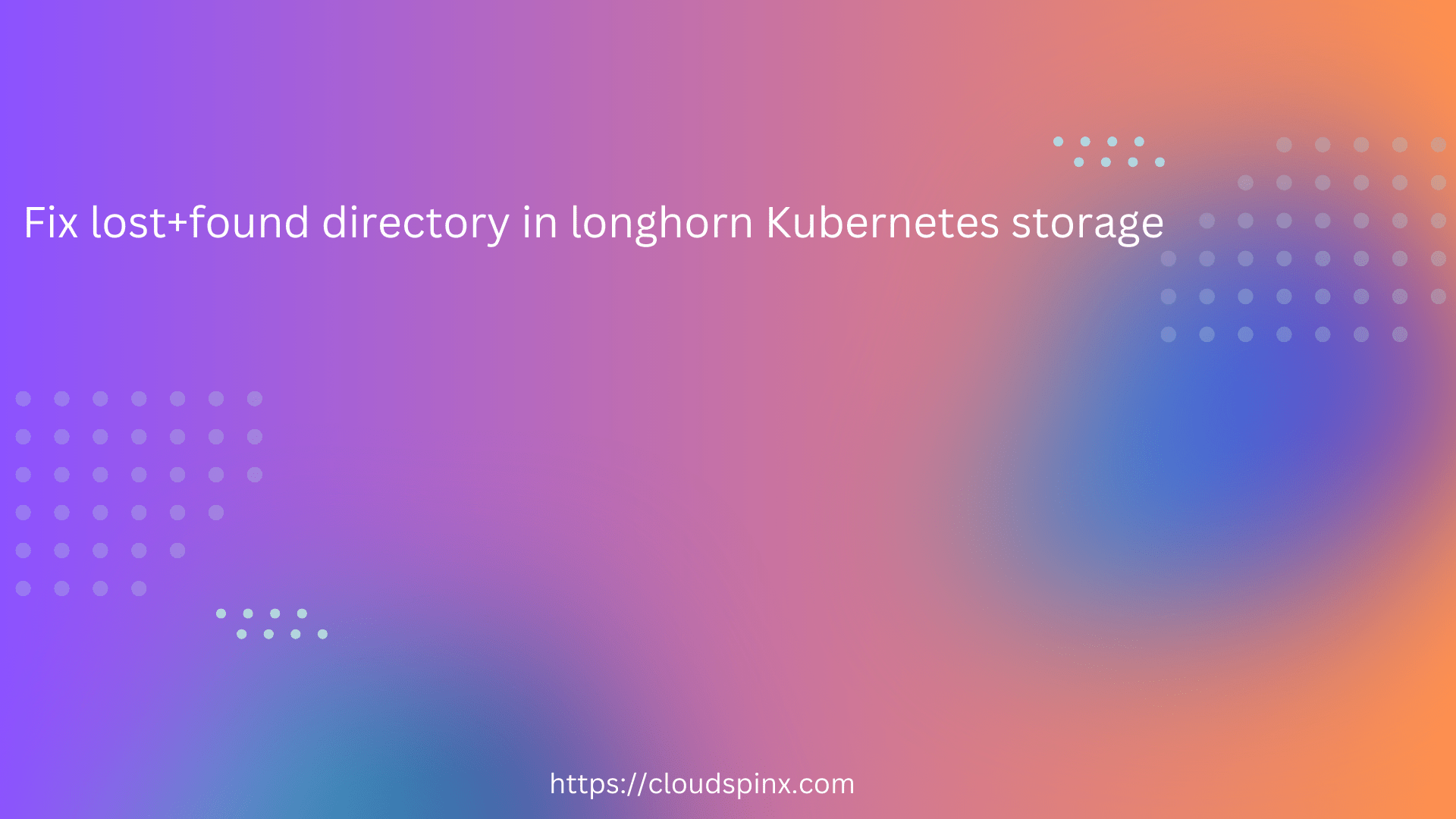Longhorn is a 100% open source and simplified cloud-native persistent block storage for your Kubernetes environment. We deployed Longhorn in a Kubernetes cluster as can be seen here:
$ kubectl get storageclasses
NAME PROVISIONER RECLAIMPOLICY VOLUMEBINDINGMODE ALLOWVOLUMEEXPANSION AGE
longhorn (default) driver.longhorn.io Delete Immediate true 20hWhile deploying PostgreSQL container in Kubernetes with persistent storage request, the pod couldn’t initialize and it was giving the following error:
$ kubectl logs postgres-0
The files belonging to this database system will be owned by user "postgres".
This user must also own the server process.
The database cluster will be initialized with locale "en_US.utf8".
The default database encoding has accordingly been set to "UTF8".
The default text search configuration will be set to "english".
Data page checksums are disabled.
initdb: error: directory "/var/lib/postgresql/data/pgdata" exists but is not empty
initdb: detail: It contains a lost+found directory, perhaps due to it being a mount point.
initdb: hint: Using a mount point directly as the data directory is not recommended.
Create a subdirectory under the mount point.If you describe the storageclass you will notice it uses ext4 filesystem which automatically adds a folder lost+found when a PV is created.
$ kubectl get sc longhorn -o yaml
allowVolumeExpansion: true
apiVersion: storage.k8s.io/v1
kind: StorageClass
metadata:
annotations:
longhorn.io/last-applied-configmap: |
kind: StorageClass
apiVersion: storage.k8s.io/v1
metadata:
name: longhorn
annotations:
storageclass.kubernetes.io/is-default-class: "true"
provisioner: driver.longhorn.io
allowVolumeExpansion: true
reclaimPolicy: "Delete"
volumeBindingMode: Immediate
parameters:
numberOfReplicas: "3"
staleReplicaTimeout: "30"
fromBackup: ""
fsType: "ext4"
dataLocality: "disabled"
unmapMarkSnapChainRemoved: "ignored"
storageclass.kubernetes.io/is-default-class: "true"
creationTimestamp: "2024-08-12T14:33:38Z"
name: longhorn
resourceVersion: "4578"
uid: 4ac796a7-4bda-44ae-8336-f56335bcb499
parameters:
dataLocality: disabled
fromBackup: ""
fsType: ext4
numberOfReplicas: "3"
staleReplicaTimeout: "30"
unmapMarkSnapChainRemoved: ignored
provisioner: driver.longhorn.io
reclaimPolicy: Delete
volumeBindingMode: ImmediateTo fix this issue, we will need to recreate the storage class which uses XFS filesystem.
Let’s create a file longhorn-xfs-sc.yaml with the following content:
apiVersion: storage.k8s.io/v1
kind: StorageClass
metadata:
name: longhorn-xfs
annotations:
storageclass.kubernetes.io/is-default-class: "true"
provisioner: driver.longhorn.io
allowVolumeExpansion: true
reclaimPolicy: Delete
volumeBindingMode: Immediate
parameters:
numberOfReplicas: "3"
staleReplicaTimeout: "30"
fromBackup: ""
fsType: "xfs"
dataLocality: "disabled"
unmapMarkSnapChainRemoved: "ignored"Create a new StorageClass using the kubectl command:
$ kubectl apply -f longhorn-xfs-sc.yaml
storageclass.storage.k8s.io/longhorn-xfs createdAfter some minutes the PostgreSQL could initialize and start properly as seen in the loogs.
$ kubectl logs postgres-0
...
server started
CREATE DATABASE
/usr/local/bin/docker-entrypoint.sh: ignoring /docker-entrypoint-initdb.d/*
waiting for server to shut down...2024-08-13 21:53:06.653 UTC [49] LOG: received fast shutdown request
.2024-08-13 21:53:06.657 UTC [49] LOG: aborting any active transactions
2024-08-13 21:53:06.658 UTC [49] LOG: background worker "logical replication launcher" (PID 55) exited with exit code 1
2024-08-13 21:53:06.659 UTC [50] LOG: shutting down
2024-08-13 21:53:06.661 UTC [50] LOG: checkpoint starting: shutdown immediate
2024-08-13 21:53:06.745 UTC [50] LOG: checkpoint complete: wrote 922 buffers (5.6%); 0 WAL file(s) added, 0 removed, 0 recycled; write=0.074 s, sync=0.007 s, total=0.086 s; sync files=301, longest=0.004 s, average=0.001 s; distance=4255 kB, estimate=4255 kB; lsn=0/1912108, redo lsn=0/1912108
2024-08-13 21:53:06.750 UTC [49] LOG: database system is shut down
done
server stopped
PostgreSQL init process complete; ready for start up.
2024-08-13 21:53:06.778 UTC [1] LOG: starting PostgreSQL 16.4 (Debian 16.4-1.pgdg120+1) on x86_64-pc-linux-gnu, compiled by gcc (Debian 12.2.0-14) 12.2.0, 64-bit
2024-08-13 21:53:06.778 UTC [1] LOG: listening on IPv4 address "0.0.0.0", port 5432
2024-08-13 21:53:06.778 UTC [1] LOG: listening on IPv6 address "::", port 5432
2024-08-13 21:53:06.782 UTC [1] LOG: listening on Unix socket "/var/run/postgresql/.s.PGSQL.5432"
2024-08-13 21:53:06.787 UTC [65] LOG: database system was shut down at 2024-08-13 21:53:06 UTC
2024-08-13 21:53:06.792 UTC [1] LOG: database system is ready to accept connectionsYou have the option of deleting the storageclass that uses ext4 to create filesystem and maintain the one for the XFS, or you can choose to have both.









